A Sales Agreement is a vital legal document that outlines the terms and conditions of a transaction between a buyer and a seller. It defines the rights, obligations, and…
continue reading
13+ SAMPLE Service Supplier Agreement
-
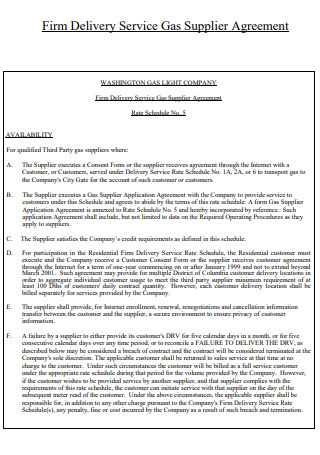
Firm Delivery Service Gas Supplier Agreement
download now -
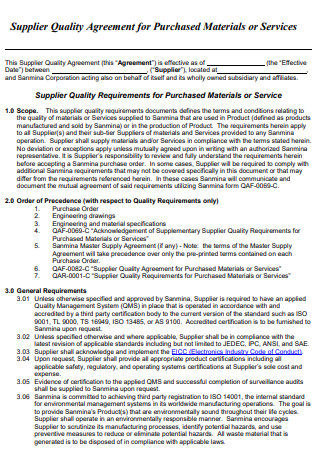
Supplier Quality Agreement for Purchased Services
download now -
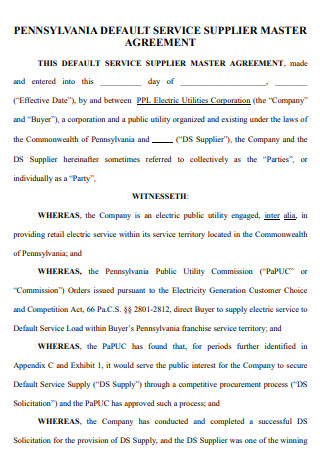
Default Service Supplier Agreement
download now -
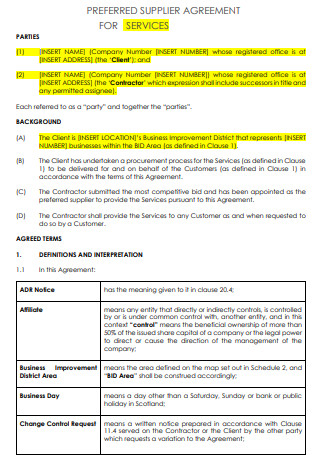
Preferred Service Supplier Agreement
download now -
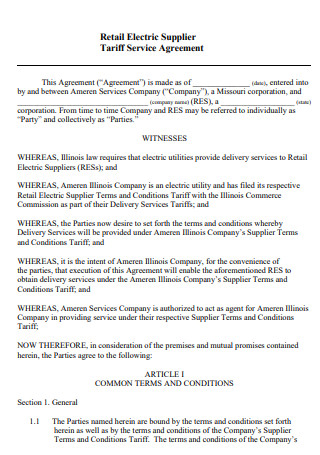
Retail Electric Supplier Tariff Service Agreement
download now -
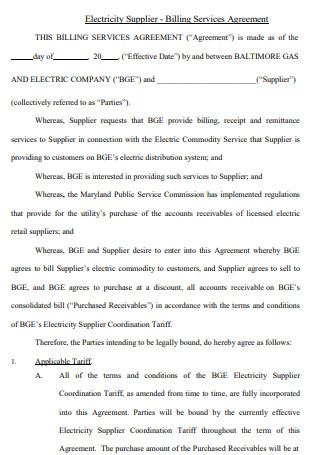
Electricity Supplier Billing Services Agreement
download now -
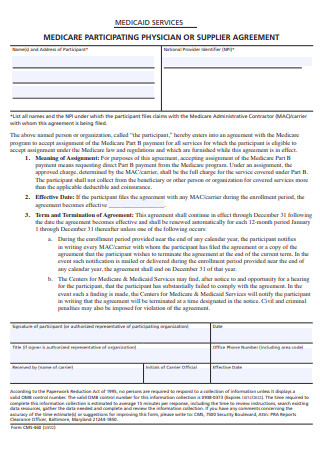
Medicare Service Supplier Agreement
download now -
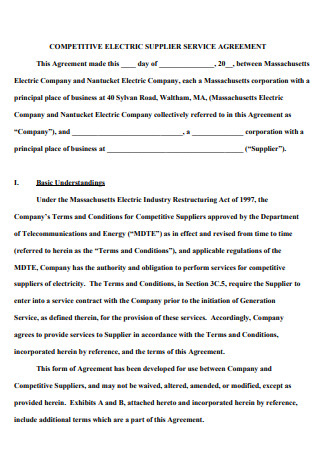
Competitive Electric Supplier Service Agreement
download now -
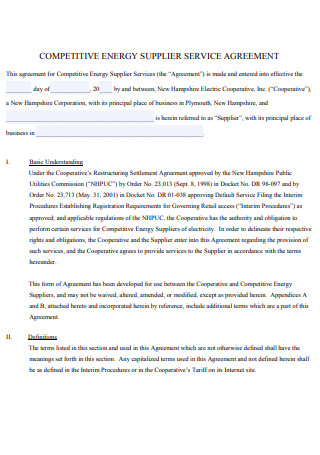
Competitive Energy Supplier Service Agreement
download now -
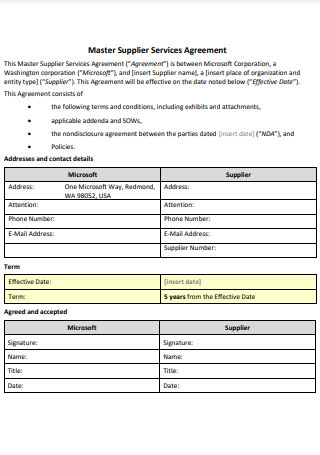
Master Supplier Services Agreement
download now -
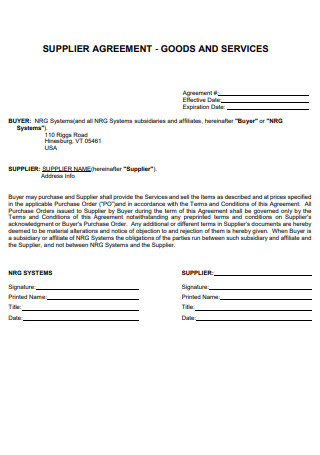
Good And Services Supplier Agreement
download now -
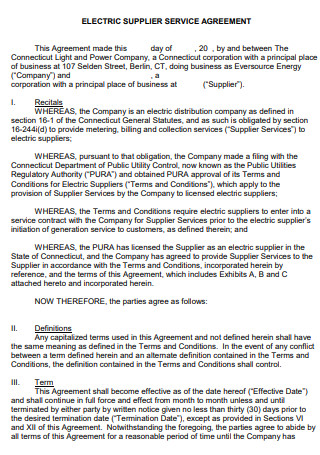
Electric Supplier Services Agreement
download now -
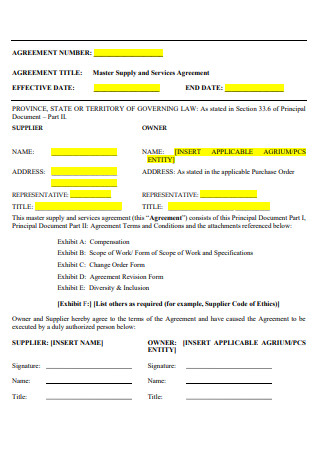
Sample Services Supplier Agreement
download now -
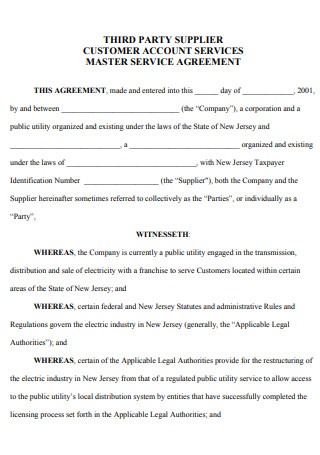
Customer Service Supplier Agreement
download now
What Is a Service Supplier Agreement?
In defining what is a service supplier agreement, let’s first find out what is a service supplier. According to Law Insider, “Service supplier means any person, including the City, who provides or sells telecommunication, video, electric, gas or water service to a user of such services within the City.” As a significant part of the supply chain, the services provided range from supplying materials, parts, personnel, and other services to produce the identified end product to the consumers. It also includes services such as the timely maintenance and repair of the end product. Hence, a service supplier agreement is a form of supplier contract documentation that contains the obligations between a consumer or a customer and the supplier that provides the terms and conditions of the distribution of the services to the consumer or customer. It is a binding legal agreement that seeks to settle whatever obligations are set out in the contract. The agreement, in the form of a written document or contract, provides transparency to both parties in regards to their rights and responsibilities in fulfilling their obligations for the service to take effect.
The supplier role in the business supply chain can be very demanding since consumers usually have high expectations of the services that they will be getting once they enter into a contract. Service suppliers should be competent enough in handling and managing customer relationships. They should also be knowledgeable about the local laws and regulations within the area that they will be getting business into. They should be quick enough to anticipate and provide resolutions along the way in case there are some barriers that disrupt the flow of the distribution of services to their customers. In our given example of a telecommunication company, an example of the services supplied are in the form of establishing and maintaining a wireless network communication and the engineering infrastructure as well.
Essential Elements of a Service Supplier Agreement
For a service supplier agreement to be successful, it needs to have important elements in place. Since it is a form of a legal contract between the supplier and the customer, it needs to contain details that are concise and consistent with what the agreed products or services are to be distributed. Here are some of the essential elements that make up a service supplier agreement:
Steps on Creating a Service Supplier Agreement
After getting an idea of what are essential elements to a service supplier agreement, you can then start drafting the agreement. It is important to note that this type of agreement should be made as a written document, and not just as an oral agreement. Written documents are more specific and concrete and have more grasp as a legally binding contract. Since it is written down, it will be the basis of how the services are to be met and performed by the service supplier, and what will be the customer’s obligation as well as part of the contract. Below are some of the important steps when creating a service supplier agreement.
Step 1: Identifying the Parties Involved
At the start of your agreement, write down all the names of the parties involved. The parties are identified as the “Supplier”, the one who will provide the services or products, and the “Customer”, the one who will be the end-user or who will be receiving the services. Write down the name of the supplier and the customer. Include their addresses, or business addresses as applicable. Indicate what type of entity are the parties, if they are a corporation, proprietorship, partnership, or a limited liability company. The terms “supplier” and “customer” can be used as references all throughout the written agreement. You can also include as part of their identification their qualifications and how long they have been in business.
Step 2: Writing Down the Scope of Work
These are the details of the service deliverables we have mentioned as essential elements of a service supplier agreement. Identify what are the specific services the supplier will be providing. Be brief and concise. Describe each of the services clearly and what is the purpose behind each. If it’s in the form of a construction, describe how the construction will be carried out. If it’s in the form of service delivery of products, how will the products be delivered to the end-customer. Describe as well the materials and resources of the supplier, where the supplier will be sourcing out in order to perform their obligations.
Step 3: Defining the Cost and Payment Terms
In this part, indicate how much is the cost of the service or products the supplier will be providing, how it will be charged (or the method of payment), and other pertinent details needed for the payment agreement. For the cost, indicate the net amount of the service, plus any other charges such as taxes or interests rates involved. Be as transparent as possible. And if there are any projected increases to the cost of service in the future, it should be clearly indicated here as well. Payment terms are the schedule of the payment and how it will be made, or how it will be billed. Depending on the agreement between the supplier and the customer, payments can be made weekly, monthly, or even annually. Modes of payment, or how the customer will be billed, can either be through cash or check or credit cards or regular bank debits. In case of any late payments, late fees should also be included in the agreement as well. Note that the obligation of payment from the customer is important in order for the obligation of the supplier to start or to continue to be effective.
Step 4: Indicate the Timeframe of the Agreement
In this section, write down the beginning and end dates of the contract. For example, the agreement will begin, or will take effect, at such date and time, once the payment obligation has been fulfilled, and will remain in full effect until such date and time after the services have been completed, or if the agreement is due for renewal. The date of effectivity of the contract signifies the start of which binds the parties to perform their obligations. Usually, the date of effectivity is the date when the parties signed the contract. Another timeframe to be included in the agreement is the turnaround time of the service schedule. For example, if it’s a construction of a telecommunication’s network tower, indicate when the construction is to begin and when it is estimated to be finished. For maintenance contract service, it is an ongoing activity, so it could be in the form of a renewing contract.
Step 5: Confidentiality Agreement
A service supplier agreement is a form of a business contract and is legally binding to both the supplier and the customer. Like all forms of contract, there should be a provision made for the confidentiality of the information that will be passed between the parties involved, and should never be disclosed to anyone not involved in the agreement. This is a protection on the part of the supplier for ownership proprietary or for intellectual property purposes, and a protection as well from possible competitors. The customer is protected as well since there is sensitive information being disclosed about the customer, such as payment details, et cetera. This part of the agreement is sometimes referred to as a non disclosure agreement.
Step 6: Termination Clause
This section is where you indicate possible legal scenarios that can terminate the agreement by either the service supplier or the customer. It can be through breach of contract, meaning either parties were not able to perform the obligations as stated out in the agreement, whether in service deliverable, payment terms, or even the confidentiality agreement. One way this clause takes effect is for the party who seeks out to terminate the contract to provide a written notice to the other party 30 days before the set out termination date.
FAQs
What is the main purpose of a Service Supplier Agreement?
The main purpose of a service supplier agreement is to provide contract transparency to both contracting parties, which is the supplier and the customer or the end-user of the service or product. The agreement lays out the rights and obligations of both parties in fulfilling the desired service.
What other kinds of clauses can be included in a Service Supplier Agreement?
Some of the other kinds of provisions or clauses that can be included in a service supplier agreement are: indemnification clauses, which causes one party to pay the other party as compensation for the damage or loss it will suffer, or that will happen in the future; warranty clauses, which guarantees the quality or standard of the service or product, or that the product is guaranteed to be fixed, maintained, or replaced within a given time period; and a force majeure clause that provides that the involved party is exempted from performing the agreed service when unforeseeable circumstances not within their control arise, making performance of the service impracticable or impossible.
What are some business types that depend on a Service Supplier Agreement?
Some of the common types of business who depend on a service supplier agreement are: financial and management consultants; real estate brokers; lawyers and accounting firms; catering; and marketing and advertising agencies.
For both the service supplier and the customer, a written agreement is their protection and assurance that the service and obligations that they have agreed upon will be met. As a legally binding documentation, both parties are assured of a smooth and successful flow of service and operation between them since everything is written down, reflecting their purpose and intent. Writing a service supplier agreement can be a bit intimidating to those who are not used to contract writing. That’s why we are here to assist you with this specific type of contract. Download our template, and see how smooth and easy it is for you to make that desired service supplier agreement!

